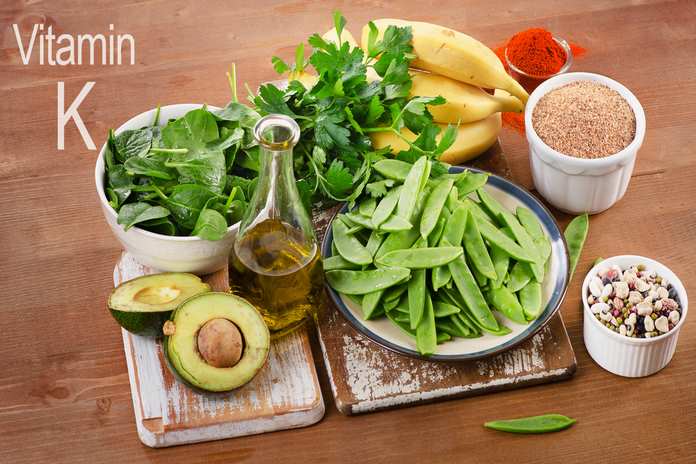Vitamin K
Vitamin K plays a major function in blood clotting. Without this vitamin, you can run the risk of bleeding to death.
Vitamin K is also a group of fat-soluble compounds, and it is divided into two groups:
- Vitamin K1 (phylloquinone)
Vitamin K1 is present in plant-sourced foods; phylloquinone is the dominant form of vitamin K in the diet.
- Vitamin K2 (menaquinone)
Vitamin K2 is found in animal-sourced foods and fermented soy products such as natto. Along with this, vitamin K2 is also produced by gut bacteria in the colon.
There are three major synthetic forms of vitamin K known as vitamin K3 (menadione), vitamin K4 (menadiol diacetate), and vitamin K5.
Vitamin K also plays a primary role in blood clotting. However, K stands for “coagulation”. It is the Danish word for coagulation that means clotting. However, vitamin K also has other functions, such as supporting bone health and preventing the calcification of blood vessels and reducing the risk of heart disease. Keep in mind that the bacteria naturally produce vitamin K in the intestines. It plays a crucial role in promoting bone health and providing proteins for blood, bones, and kidneys.
To keep the body healthy, Vitamin E plays a significant role. Some of the best sources are leafy green vegetables. Vitamin K2 is mainly found in animal-sourced foods and fermented soy products. Share on Pinterest. In contrast to phylloquinone, menaquinone is only present in small amounts in certain high-fat, animal-sourced foods, like egg yolks, butter, and liver.
Unlike vitamins A or D, vitamin K never store in the body. For this reason, consuming a diet that lacks vitamins may lead you to become deficient in as little as a week. However, People who do not efficiently digest or absorb fat are at the highest risk of developing vitamin K deficiency.
Moreover, the use of broad-spectrum antibiotics also raises the risk of deficiency, as well as very high doses of vitamin A that seem to reduce the absorption of vitamin K. Mega-doses of vitamin E also counteract the effects of vitamin K on blood clotting.
Keep in mind that your blood cannot clot without vitamin K and even a small wound could cause unstoppable bleeding. It is fascinating to know that vitamin K deficiency is rare since the body only needs small amounts to maintain blood clotting. Low levels of vitamin K are also linked with reduced bone density as well as increased risk of fractures in women.
Unlike the other fat-soluble vitamins, vitamin K also has no known symptoms of toxicity. However, a synthetic form of vitamin K, menadione, or vitamin K3, have some adverse effects while consumed in high amounts.
Unlike all fat-soluble vitamins, water-soluble vitamins do not store in the body. For this reason, it is crucial to get them regularly from your diet.

